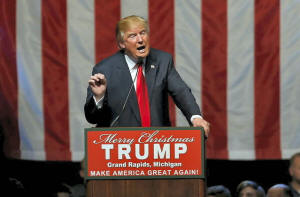|
 Trump's
proposed tax cuts would send U.S. debt surging - analysis Trump's
proposed tax cuts would send U.S. debt surging - analysis
 Send a link to a friend
Send a link to a friend
[December 23, 2015]
NEW YORK (Reuters) - Republican
presidential hopeful Donald Trump's tax proposal would cut taxes for
households and businesses but would significantly raise the national
debt, according to an analysis by the centrist Brookings-Urban Institute
Tax Policy Center.
|
|
 While federal taxes would be lower for households across all
income levels, the highest earners - the top 1 percent and
particularly the top 0.1 of 1 percent - would reap the largest
rewards, according to the analysis, which was released on Tuesday. While federal taxes would be lower for households across all
income levels, the highest earners - the top 1 percent and
particularly the top 0.1 of 1 percent - would reap the largest
rewards, according to the analysis, which was released on Tuesday.
The plan would reduce federal revenues by $9.5 trillion in its first
decade and the U.S. national debt would jump by as much as 80
percent of the country's gross domestic product by 2036, which could
drag on growth, the analysis found.
"It’s just gaping holes in the budget," Roberton Williams, a senior
fellow at the Tax Policy Center, said of Trump's plan. "You can't
really cut revenues as much as the plan would do and still have a
functioning government that still looks anything like the government
we have right now."
 In September Trump proposed making the U.S. tax code simpler and a
one-time levy on the overseas earnings of U.S. companies. He
promised he would cut the top tax rate for all businesses to 15
percent from the present 35 percent.
"The policy speaks for itself and many experts including [economist
and media commentator] Larry Kudlow have praised the plan since its
release in September," Trump spokeswoman Hope Hicks said in an
email.
Republican presidential candidates have laid out a variety of tax
proposals, particularly touting the various ways they can lower tax
rates for households and businesses.
[to top of second column] |

Trump, a billionaire real estate developer and reality television
star, remains the front runner for the Republican nomination for the
November 2016 presidential election. He has emphasized his business
acumen as among his top credentials for the White House, pointing to
his success in making money as a sign that he can boost the world's
biggest economy.
He currently has support from 31 percent of his party in a five-day
rolling poll from Reuters/Ipsos dated Dec. 18. His next-closest
rival, Senator Ted Cruz, has support from 17 percent of the party.
For more on the 2016 presidential race, see the Reuters blog, “Tales
from the Trail” (http://blogs.reuters.com/talesfromthetrail/)
(Reporting by Luciana Lopez; Editing by Bill Trott)
[© 2015 Thomson Reuters. All rights
reserved.]
Copyright 2015 Reuters. All rights reserved. This material may not be published,
broadcast, rewritten or redistributed.

 |